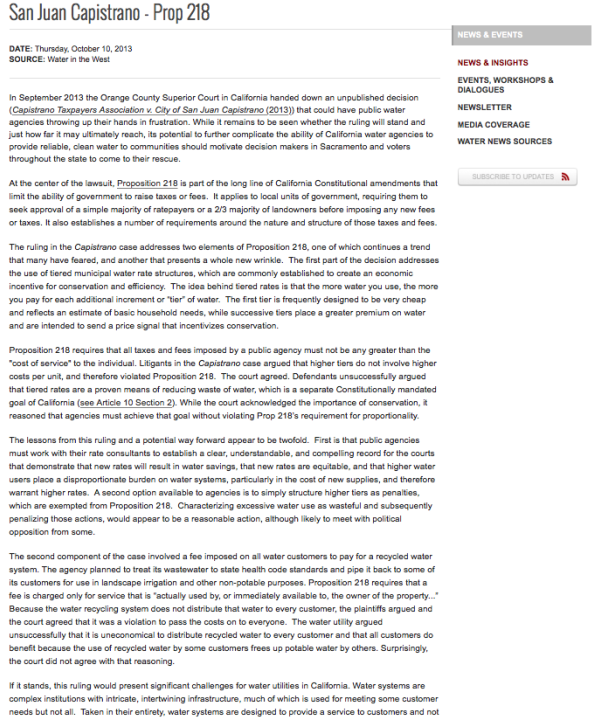October 10, 2013 | Water in the West | Insights
In September 2013 the Orange County Superior Court in California handed down an unpublished decision (Capistrano Taxpayers Association v. City of San Juan Capistrano (2013)) that could have public water agencies throwing up their hands in frustration. While it remains to be seen whether the ruling will stand and just how far it may ultimately reach, its potential to further complicate the ability of California water agencies to provide reliable, clean water to communities should motivate decision makers in Sacramento and voters throughout the state to come to their rescue.
At the center of the lawsuit, Proposition 218 is part of the long line of California Constitutional amendments that limit the ability of government to raise taxes or fees. It applies to local units of government, requiring them to seek approval of a simple majority of ratepayers or a 2/3 majority of landowners before imposing any new fees or taxes. It also establishes a number of requirements around the nature and structure of those taxes and fees.
The ruling in the Capistrano case addresses two elements of Proposition 218, one of which continues a trend that many have feared, and another that presents a whole new wrinkle. The first part of the decision addresses the use of tiered municipal water rate structures, which are commonly established to create an economic incentive for conservation and efficiency. The idea behind tiered rates is that the more water you use, the more you pay for each additional increment or “tier” of water. The first tier is frequently designed to be very cheap and reflects an estimate of basic household needs, while successive tiers place a greater premium on water and are intended to send a price signal that incentivizes conservation.
Proposition 218 requires that all taxes and fees imposed by a public agency must not be any greater than the "cost of service" to the individual. Litigants in the Capistrano case argued that higher tiers do not involve higher costs per unit, and therefore violated Proposition 218. The court agreed. Defendants unsuccessfully argued that tiered rates are a proven means of reducing waste of water, which is a separate Constitutionally mandated goal of California (see Article 10 Section 2). While the court acknowledged the importance of conservation, it reasoned that agencies must achieve that goal without violating Prop 218’s requirement for proportionality.
The lessons from this ruling and a potential way forward appear to be twofold. First is that public agencies must work with their rate consultants to establish a clear, understandable, and compelling record for the courts that demonstrate that new rates will result in water savings, that new rates are equitable, and that higher water users place a disproportionate burden on water systems, particularly in the cost of new supplies, and therefore warrant higher rates. A second option available to agencies is to simply structure higher tiers as penalties, which are exempted from Proposition 218. Characterizing excessive water use as wasteful and subsequently penalizing those actions, would appear to be a reasonable action, although likely to meet with political opposition from some.
The second component of the case involved a fee imposed on all water customers to pay for a recycled water system. The agency planned to treat its wastewater to state health code standards and pipe it back to some of its customers for use in landscape irrigation and other non-potable purposes. Proposition 218 requires that a fee is charged only for service that is “actually used by, or immediately available to, the owner of the property...” Because the water recycling system does not distribute that water to every customer, the plaintiffs argued and the court agreed that it was a violation to pass the costs on to everyone. The water utility argued unsuccessfully that it is uneconomical to distribute recycled water to every customer and that all customers do benefit because the use of recycled water by some customers frees up potable water by others. Surprisingly, the court did not agree with that reasoning.
If it stands, this ruling would present significant challenges for water utilities in California. Water systems are complex institutions with intricate, intertwining infrastructure, much of which is used for meeting some customer needs but not all. Taken in their entirety, water systems are designed to provide a service to customers and not merely deliver an assortment of commodities, with one flavor of water going here and another there. It is completely impractical to imagine a utility having to allocate costs strictly to who uses what part of the water system. Many utilities provision water from several different sources, each of which involves different pieces of infrastructure and different costs of service. If they were forced to track which of their customers received which water and charge them differently – the logical extension of the ruling in San Juan Capistrano – it would result in an inefficient mess. Should we now expect water agencies to track individual water molecules and which pipes they travel? Let’s hope not!
Transparency and oversight of public agencies – goals of Proposition 218 – are good public policy, but they need not sacrifice common sense and reasonable efficiency. Proposition 218 has begun to inadvertently threaten one of the most stable, reliable, and important institutions in our society – our public water agencies. Clever attorneys may find ways to work around these latest legal interpretations, but lawmakers and ultimately the public, should carefully examine whether things have gone too far, and do something about it.


![[Woods Logo]](/sites/default/files/logos/footer-logo-woods.png)
![[Bill Lane Center Logo]](/sites/default/files/logos/footer-logo-billlane.png)